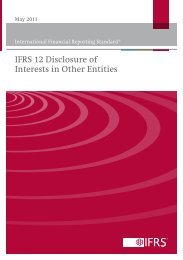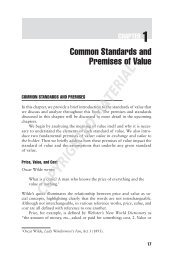ISSUE 5 2008 - Sweet & Maxwell
ISSUE 5 2008 - Sweet & Maxwell
ISSUE 5 2008 - Sweet & Maxwell
You also want an ePaper? Increase the reach of your titles
YUMPU automatically turns print PDFs into web optimized ePapers that Google loves.
Crim. L.R. Trial 407<br />
appropriate resources or necessary competence. The ruling, however, was binding<br />
on the solicitor, as it was on the barrister, and indeed everyone else involved in<br />
the conduct of the case. In the context of the conduct of criminal litigation, the<br />
solicitor was an officer of the court. He had an obligation to the court to comply<br />
with its orders, and to do his best for his client in the light of those orders. Neither<br />
barristers nor solicitors in such circumstances would be in breach of the rules of<br />
their profession, nor acting improperly or negligently, if the worse that could be<br />
said was that they were doing their best to comply with orders of the court which<br />
made it impossible or difficult to look after the client’s interests to the standard<br />
which, without those difficulties, they would normally be expected to achieve. In<br />
the present case, the decisions of the new teams of barristers and solicitors were<br />
wrong. However, in all the circumstances of the present case, and in the light of<br />
the strength of the prosecution case, the conviction was not unsafe.<br />
Cases considered: Jones [2002] UKHL 5; [2002] 2 Cr. App. R. 9; G [2004]<br />
EWCA Crim 1368; [2004] 2 Cr. App. R. 37; Al Zubeidi [1999] Crim. L.R. 906.<br />
[Reported by Vanessa Higgins, Barrister]<br />
Benjamin Aina for the defendant.<br />
Charles Garside, Q.C. and Roger Smart for the Crown.<br />
Timothy Cray for the General Council of the Bar.<br />
Bruce Holder, Q.C. for the Law Society.<br />
Commentary. Article 6(3)(c) of the European Convention on Human Rights speaks<br />
of an accused’s right to defend himself in person or through a legal representative<br />
of his choosing. However, the danger of a defendant rejecting counsel on spurious<br />
grounds in an attempt to prolong and frustrate the trial cannot be ignored. To prevent<br />
a trial being derailed may, on occasion, demand fairly robust control by the trial judge<br />
but that may be necessary to ensure fairness to all parties in the proceedings including,<br />
in this case, other defendants. There may be occasions such as the present one when<br />
defendants completely change their instructions to counsel at a late stage in the trial,<br />
placing counsel in a very difficult position. Whether counsel choose to continue to<br />
represent the defendant or feel that they are so professionally embarrassed that they<br />
cannot continue with the case must be a decision for counsel to take. This has been<br />
recognised as such in numerous cases, including GandB[2004] EWCA Crim 1368;<br />
[2004] 2 Cr. App. R. 37; Jones (No.2) (1972) 56 Cr. App. R. 413; Shaw (1980) 70<br />
Cr. App. R. 313. Given that counsel will invariably be better informed than the judge<br />
and that there may well be considerations that counsel is unable to reveal, it is difficult<br />
to envisage a scenario in which the judge would direct counsel to continue or refuse<br />
permission to withdraw (for the provision of legal representation at public expense<br />
and the grounds for an application for a change of representative, see the Criminal<br />
Defence Service (General) (No.2) Regulations 2001, reg.16). If defendants do seek to<br />
change their legal representative then the judge should ensure they are clear in the<br />
decision and that any adverse consequences of such a change are minimised for all<br />
involved in the trial, for example through an appropriate adjournment. However, the<br />
judge should not engage in an investigation of the decision which would, for example,<br />
involve personal discussions with defendants as the potential for bias in this approach<br />
is all too apparent.<br />
In most circumstances when defendants seek to change their representative the<br />
court will permit this, however, each case inevitably turns on its own facts though a<br />
© SWEET &MAXWELL






